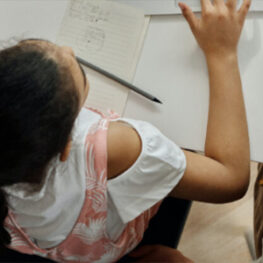The education of care-experienced children should be redefined to include a much broader range of activities to better support their development and success, a new study says.
Those who have been looked after perceive education in a much wider way than other young people, including their life experiences and social skills not just exams, the research shows.
Regardless of their performance in school, those who took part in the study portrayed themselves as achievers in the context of this broader concept of ‘education’ and described being as proud of qualities such as independence, agency and capacity to strive for and achieve goals as much as academic work. This means traditional measures of education are too narrow to be able to fully capture their experiences.
The study says there would be benefits for teachers, social workers and others to work more closely with children in care when making decisions, centring their lived experiences and drawing on their insights so
as to achieve a better balance of support for both formal and informal educational opportunities.
The study recommends greater use of the “Conditions for Learning” model, which enables learning to be
identified across the life of the young person. This could help to promote a positive view of education,
giving opportunities to extend conversations beyond GCSE or A level performance whilst also allowing
achievements in one area of learning to foster interest in the more formally measured educational arena.
The study, by Karen Kenny from the University of Exeter, is published in the journal Adoption and
Fostering.
Dr Kenny interviewed seven individuals who were or had been in care and were aged 11 to 59 and were
living in the South West. In total 30 unstructured interviews were conducted, lasting between 141 and
349 minutes.
Dr Kenny said: “This study counters a mostly negative discourse because it suggests that people who
have been in care are surprisingly positive in their comments about learning, growth and development – it just so happens that these have occurred outside of formal education. In other words, previous definitions are too narrow to capture the life lessons that those with care experience themselves report.
“This is not to undervalue traditional education, but to promote the celebration of all learning, both
formal and informal. The framework helps us to identify the different areas of learning to support this
new perspective.
For example both 14-year-old Anne and 37-year-old Gary recalled punishments that had been meted out
to them which they saw as advantageous to themselves. Both could not change the event, but they could
change the way they viewed and responded to their situation. Susan refused to change school aged 13
and said she was proud she had forced care staff to find a placement that catered to her demands.
Dr Kenny said: “By analysing the narratives that children in care relate about thinking, doing and being,
we can clearly see that their learning and development encompasses, and is shaped by, far more than
what happens within formal school establishments. Especially since many carers cannot adequately
support the formal education of the young people they look after, it is important to recognise the many
other opportunities and influences available to individuals in the care experience – and to use this
information to empower them to reframe their situations and proactively make informed decisions in
pursuit of current and future goals.
“The participants did not limit their understanding of education to the narrow perspective of school
qualifications attained; they narrated stories of learning across their whole life experience. Much of what
they talked about was unplanned endeavour.”
